Umicore signs recycling agreement with ACC
The materials technology and recycling group Umicore has signed an agreement with the battery cell joint venture Automotive Cells Company (ACC) of Stellantis, Total and Mercedes-Benz for battery recycling services for the needs of the ACC pilot plant in Nersac, France.
The go-ahead for pilot production in Nersac was given in January 2020, even before the ACC joint venture was officially established in September 2020 – and well before Mercedes joined ACC in September 2021.
“Our pilot line in Nersac aims to test all our product and process solutions before mass production in our future Gigafactories,” says Gilles Tardivo, ACC’s vice president for the Nersac pilot plant. “The agreement between ACC for Nersac and Umicore fits perfectly into this framework, allowing us to improve our expertise, locally, regarding the recycling of our production waste. This is an important step in our larger policy of recycling our future batteries.”
The recycling itself will not take place in Nersac, but at Umicore’s recycling facility in Hoboken, Belgium. The facility has an annual recycling capacity of 7,000 tonnes for lithium-ion (Li-ion) batteries and production waste from battery manufacturing. This amount is equivalent to about 35,000 batteries from electric vehicles.
Umicore states in the release that the latest generation of its proprietary recycling technology is to be introduced in the course of 2022. ACC should also benefit from this.
Umicore does not give details about the process, but it does about the results: The significantly improved metallurgical process is said to achieve a yield of over 95 per cent for a “wide range of battery chemistries”. Moreover, it is the first technology of its kind “to recover most of the lithium, solving a key constraint of today’s existing recycling flowsheets”. As the material flow has been largely automated and manual intervention is said to be rarely required, process stability and efficiency will also be further enhanced, he added. The metals recovered in this way are said to be of battery quality so that they can be used in new cells.
“By recovering key critical elements for the Li-ion battery supply chain, such as lithium, cobalt, nickel and copper, in the most efficient and environmentally friendly way, Umicore is leading the way towards a battery circular economy, providing solutions to the growing demand for sustainably sourced materials while lowering their CO2 impact,” says Denis Goffaux, Executive Vice President of Umicore. “Battery recycling is a key ingredient of sustainable electric mobility and is fully in line with Umicore’s overall closed-loop philosophy.”
With reporting by Sebastian Schaal, Germany.





0 Comments